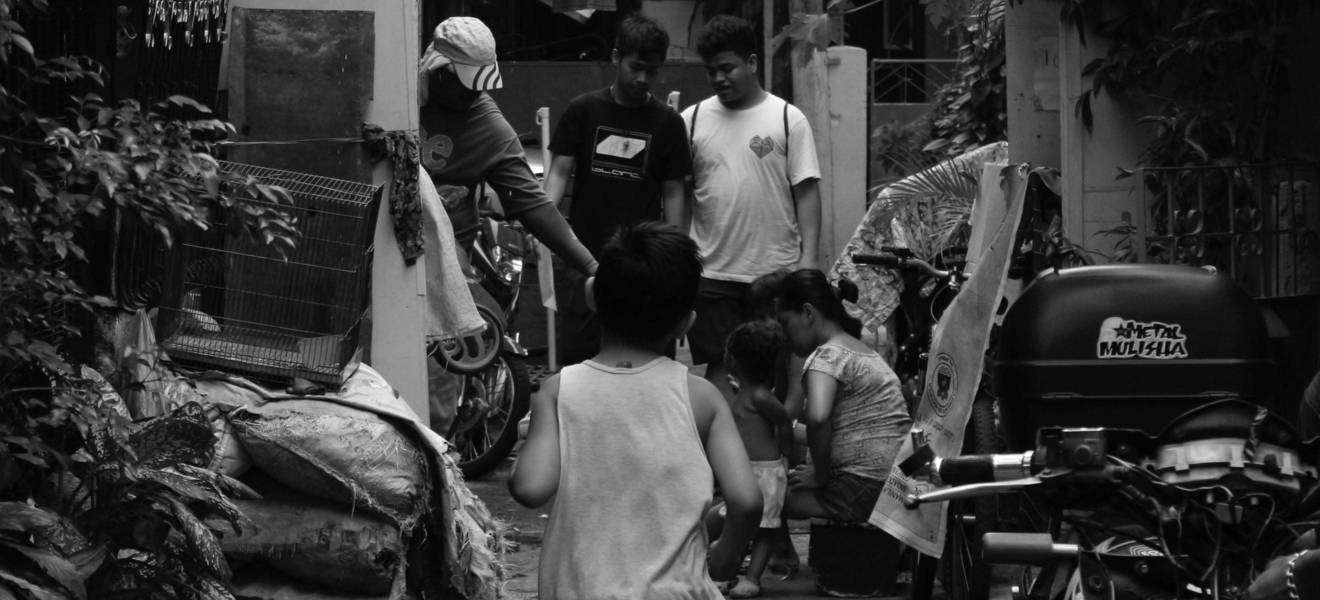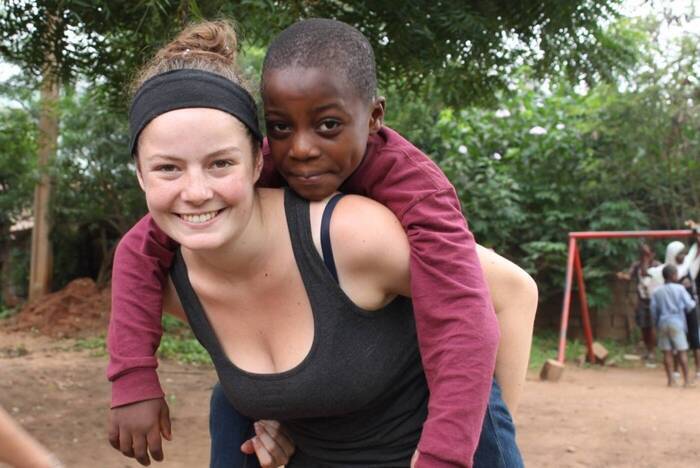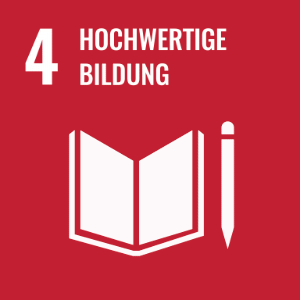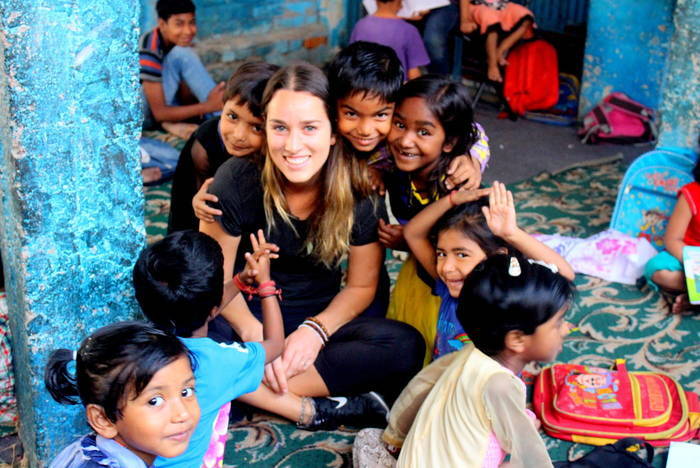February 25.04.2022th, XNUMX / Successes on site
Concept for the street kids project in Ghana
The Street children project in Ghana is a Contact point for children from the surrounding slums and children who come from unstructured, complicated family relationships. The age of the children is between 2 and 10 years.
The Rough goal of the project: To convey basic skills in the social, emotional, cognitive and motor areas in order to also give children from disadvantaged social classes the opportunity to create a basis for their further actions.

Carrier
Carrier is the independent organization Rainbow Garden Village, abbreviated “RGV”. This offers different projects, including in the medical, social and animal welfare area in Africa, Asia, Latin America, Oceania and Europe at. The Headquarters of the organization is in Munich, but there is a main contact point in each destination country. The local main contact person - in Ghana this is William - has an overview of the individual projects, the volunteers, interns and the local host families. The street children project is sponsored by the main organizer Wilhelmina Awuku-Yeboah in Accra. On site, the volunteers and interns are accompanied by William, who is at their side with questions, communication problems and purchases for the project.
Financing
The project is financed by the participation fees of the RGV Volunteers, since the organization is not state-sponsored or subsidized. Materials are mostly brought from Germany or bought locally. At the same time, the project supported by donations.
local events
The street children project is on the grounds of RGV host mom Mama Mina integrated. A large row of bushes separates the project from the rest of the property. On the other three sides, the area is fenced off by a stone wall. On the right is a grove of banana trees and some thickets. The project area is rectangular. On the long side (by the stone wall) there is a pavilion on a concrete base. Below are four tables with five chairs each. (Roughly speaking: four children per table and one volunteer). Each table corresponds to a class. A cupboard containing school materials, attendance lists, etc. is leaning against the stone wall.
On the bush side you will find a swing. Other devices such as a children's vehicle can be used on the uneven middle ground. On the other side of the row of bushes, next to the snack bar (an on-site and employee-run store), there is a permanent toilet.
The project is located in a residential area and close to a regular school. Most of the houses are built very generously and are fenced in by high concrete walls that end in wire mesh. On the other side you can see many unfinished houses and numerous slums. Opposite the project area there is a small sales stand that is also accessible to the children. The passing street ends at an intersection at the police station.
mission
The child and his needs are in the Center of educational work. The teaching of school content is a part of this. The work is based on the basic pedagogical attitudes of Carl Rodgers. This means that the child is approached with empathy (empathy), acceptance (appreciation) and congruence (authenticity). Authenticity is understood to mean expressing one's feelings appropriately but honestly and perceiving and communicating one's own limits.
On the whole, that's the Needs of a humanwho should or must be breastfed. They should be worked through from the physiological needs to the self-actualization needs. This serves as an orientation for pedagogical action.
Furthermore, one can say to the mission statement that the Montessori method embedded in the Ghanaian everyday life of self-employment. We therefore want the project to this Pedagogy direction lean against Every child has their own blueprint and our task is to pick up the child where it is and accompany it. "Help me to do it myself" – this sentence fits the project and it should become a daily companion.
In Ghana, methods like the slap, the cane or the ruler are considered INSTRUCTIONAL applied. The RGV volunteers and employees in the street children project will not use these educational measures. In cooperation with the wearer, this measure is only used by her in serious cases. The RGV volunteers use the following educational measures: praise and rewards, active listening, creating a sense of achievement, consequences for unwanted behavior, time-out measures, fixed group rules.
authority denotes the holding of social power. The guiding principle is based on the assumption that the RGV volunteers are aware of their position and accordingly take factually based consequences.
Attendance sheet
The attendance list in the group book must be updated continuously every day. This gives some children the opportunity to attend or continue to attend school, for which financial donors are necessary. These need some evidence of the children's reliability, regularity and progress.
The Contact details of the children must be checked and documented at regular intervals for renewals (e.g. new telephone number of the parents). New children must be fully enrolled in the group book.
In the case of new arrivals, an interview must be held with the employee or Mama Mina and (if possible) with the contact person, in which the necessary information, such as full name, date of birth, contact person, family circumstances, important drastic events from the child's past, siblings , allergies, illnesses, place of residence, current grade level, are written down.
Due to the low level of knowledge of many slum dwellers, some parents are unaware of their child's exact date of birth. For the most part, the children only know one age, but even this can vary by a few years. The task of the RGV participants is to determine a realistic age for the child and to set a date of birth together with him. This is written down and also passed on to William and Mama Mina.
daily routine
8.00 am - 9.30 pm
After breakfast, the RGV volunteers have one hour to prepare, in order to present the most important cornerstones, eg specific offers, birthdays, the family situation of a child, specific case discussions, etc., and to plan how to proceed. The delivery time is one hour. Time plays a less important role in Ghana, but it is possible that most of the children will arrive within this period. At the same time, the delivery time is also used as the first planned playing time. The children are provided with jigsaw puzzles, memories and painting materials that were brought from Germany.
9.30 am - 11.00 pm
The small groups meet at the respective class table for lessons (1st – 4th grade). There are exercises in English, math, social and moral education and in the ecological field. The project is more based on the German "crib system" and should consist of age-appropriate offers and enable the participants to "be a child for once".
11.00 am - 12.00 pm
After the lesson, there will be a free play unit to compensate. Here the area can be used to the full extent by the children. The sporting aspect in particular comes into play here. It is also the time to prepare for lunch together. Two children are planned to support the volunteers, for example by setting the table, putting chairs around the table, etc.
12.00 am - 12.10 pm
In the midday circle, everyone comes together in a permanent place (outdoors under a roof/in the open air), depending on the weather. Counting together, small finger plays, songs, special features in the daily routine are part of the inventory.
The time is also used to explore a specific topic with the children, such as cholera precautions.
12.10 am - 12.45 pm
Lunch is picked up with the children from the kitchen by host mom Mama Mina and then eaten together. There are mostly traditional local dishes, e.g. FuFu. The variation is limited.
12.45 am - 13.00 pm
Depending on the weather, the closing circle takes place in the same place next to the "Shame-Shame-Tree". Songs and rhymes are sung together. The children are said goodbye.
Set
We have classified the goals into four sub-areas. All goals are individually adapted to the child, their age and developmental level.
cognitive area
- Basic knowledge of mathematics should be imparted so that the children have a basis for their future. By this we mean the number range up to 500, addition, subtraction, division, multiplication, set theory, etc.
- Since English is the official language in Ghana, the basic vocabulary, the grammar, the writing, etc. contributes to the communication in everyday life and therefore has high priority.
- Further education for children from the slum is uncertain, dependent on family money etc. Therefore, we have set the goal of making connections in the broad area of logical thinking. The more independently and logically a child can grasp connections, the better it can later find its way around in “everyday life full of negotiations”.
- The strengthening of imagination and creativity should enable the children to take the time to dream, but also to get along with "little" and to use the resources in new ways. This is suitable, for example, for recycling, meditation, handicrafts, etc.
- For many children, the promotion of independence is only necessary as an accompaniment, since everyday life requires a lot of responsibility such as getting breakfast independently, the sole way to the facility and back, etc. Our goal is therefore to support independence appropriately and playfully.
Social area
Especially we have the Mediation of manners or values and norms. Observations have shown that Ghana is a very helpful, open-hearted country in principle, but people use basic forms of politeness, such as saying "please" and "thank you" or letting them finish speaking, to a lesser extent. Therefore we want to combine the Ghanaian traditions with the German familiarity and show the children both.
The conflict management of many children from the slum is mostly one-sided and violent. We have set ourselves the task of pointing out different conflict resolution strategies and supporting the children in their application. At the same time, the resilience of each individual should be strengthened, which is a permanent necessity in the everyday life of the children. For the children is also the Acceptance / appreciation an important component because social action and self-perception are immensely influenced by it. The aim is to recognize performance and exemplary social behavior and to show appropriate physical affection.
In the field of communication, we have set ourselves the sub-goals in conveying facial expressions and gestures in congruence and traditional forms of communication. Since "negotiation" is a prerequisite for the Ghanaian rotation, skillful, diverse communication is of great value. Because a lot is also demanded of children in this area from a young age, for example in the area of meal organization. In connection with "negotiating" it is also important to develop and expand the ability and willingness to cooperate. Because fundamentally those prevail in Ghana who are characterized by cooperation. We want to achieve this through integration and group games.
The expression "Gender Education" is not very common in this country. The term “emancipation” and “gender equality” has certainly been heard by some people, but implementation could still be improved. Accordingly, we would like to take up and discuss the traditional distribution of roles with the children, recognize differences and strive for freedom from prejudice, etc.
emotional area
Empathy serves as a prerequisite for social action, so it is of great importance for us to train this ability to put yourself in the other person's emotional world and the ability to change perspective. Through various methods, eg I-messages, paraphrasing, reinforcement, token system, etc., we want to promote this quality and thus also counteract the use of violence. Getting to know, perceiving and interpreting different feelings, as well as allowing and showing feelings, are characteristics that make living together, but also your own well-being, considerably easier. The aim behind this is to transmit impulse control to the children so that they can cope with the different situations in life.
mourning plays a major role in connection with the street children, since the loss of family members and fighting illnesses are part of everyday life. Addiction to drugs is also not an isolated case in the slums. Therefore, the children should be offered emotional support and at the same time opportunities to tackle the future. Self-confidence and self-confidence are part of life and especially when, as originally intended by nature, the stronger usually prevails, these skills are needed. The aim is therefore to build up these qualities, to strengthen them and to teach them to the children, regardless of their origin. Resilience or resilience has an even more profound validity here in Ghana, since this is a prerequisite from an early age, especially in a slum. We therefore want to build resilience to a healthy extent and make sure that no emotional dullness develops.
motor area
In general, it can be observed that most Ghanaian children have good motor skills from an early age. They are usually confronted with motor challenges from an early age, such as unsecured road conditions and having to walk long distances. The following goals are to be further developed and in some cases also built up.
- Space - Location - Perception (ball games, swings, everyday exercises)
- Hand - eye - coordination (food with cutlery or hands, writing, ball games)
- Balance (balancing, swinging, climbing)
- Fine motor skills (painting, cutting, holding a pen, eating with cutlery or hands)
- Gross motor skills (catch and running games)
- Body perception (ball games, catching and running games, balancing)
role of the educator
- Contact person for children, parents, porters
- Function as a teacher (in relation to the teaching of basic school knowledge)
- Responsible authority figure
- Organization of the day
- Documentation (presence, back / progress, incidents)
- Observation (planned, concealed, participatory, non-participative)
- Basic attitudes according to Carl Rodgers (empathy, acceptance, congruence as explained above)
- Situational action
- Integrating work through changing group population
- Partial parental work, mostly supported by the porter, due to the lack of English language skills on the part of the parents
More projects that interest you could
Have you not yet discovered a suitable program for your time abroad? No problem, we will present you more Volunteer projects abroadthat might pique your interest.
Are you perhaps still at the beginning of thinking about your trip and have no idea what might be right for you? Whether you want to go abroad as a volunteer for a short time, or if you prefer FSJ up to 12 months abroad afford? Maybe there is one Internship abroad in a specific subject area the best way for you to gain experience abroad?


Ghana | childcare


India | Teach

Namibia | childcare

Uganda | childcare

South Africa | childcare

Tanzania & Zanzibar | childcare
